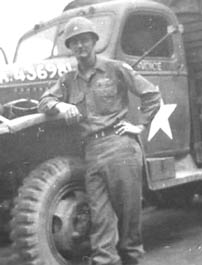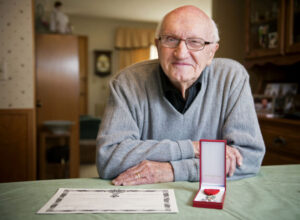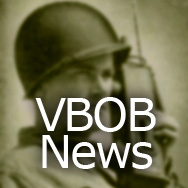
He had grown up on a farm and knew how to drive, so the Army gave Frank Chambers a truck. So many other recruits, city kids without licenses, had to carry rifles. “I was really fortunate,” he said this week from his kitchen table near Holmes Lake in Lincoln. “In any infantry, the best place to be is in a truck.”
His was an older GM deuce-and-a-half, and it had already seen action in North Africa by the time he climbed behind its wheel. But that truck kept him warm and it kept him dry and, when he cooked his canned beans and soup with the warmth of the engine’s manifold, it kept him fed.
He drove it into World War II, all over Europe, 10,000 miles through snow and mud and night. He hauled supplies and men, but mostly he towed the howitzer cannon that helped push the Germans out of France, twice.
And then he drove that six-by-six, safely, out of the war. He returned to the States to a long career and a longer marriage. He went decades without talking about his service — or even thinking about it much — until about 18 years ago, when a grandson asked about it.
Since then, the 90-year-old former Farm Bureau and Gallup employee has documented his experiences — both the big picture and the bracing details, like shaving in zero-degree weather — for his family.
He’s spoken to students and assembled a home library of World War II books. He’s attended reunions of the 75th Division and tracked down old friends, or their widows.
And late last month, wearing a gray suit coat and striped tie in the sixth-floor library of the French embassy in Houston, and with Doris and their daughter and grandchildren watching, Chambers was named a knight in the French Legion of Honor for his service to that country 69 years ago.
The consul general, Surijo Seam, spoke of the long friendship between France and the U.S. He spoke of the award, his country’s highest decoration. He spoke of the U.S. service members who fought in France during World War II.
“Frank Chambers,” he said, pinning the Legion of Honor on the Nebraskan, “you are one of these valiant and brave American heroes.”
He unwraps the rubber band from the red box, revealing the award that dates to 1802, when it was instituted by Napoleon Bonaparte.
This one came by FedEx.
Chambers applied for it in 2012, sending to the embassy in Chicago the proof of his service in France nearly 70 years ago.
The son of farmers from western Illinois was drafted in 1943. He’d had howitzer training in the ROTC, so the Army sent him to artillery training in Oklahoma. But then it selected him for specialized training.
“They needed civil engineers for the rebuilding of Germany and the world after the war. They thought that would be the purpose of these fellows.”
Six months into the program in Wisconsin, the Army shut it down. So he joined the Air Corps program and was sent to West Virginia. He wanted to be a pilot or, at least, part of the flight crew.
The Army shut that down, too, four months later. It needed fresh troops as it readied ground forces for the upcoming battles in Europe. Nearly 35,000 aviation cadets found themselves out of that program, he said.
“The generals in charge there, they were really upset about all of these guys over here in cushy jobs.” So he was sent to the 75th Infantry Division and, because of his artillery training and farm background, assigned a truck. He sometimes had an assistant driver, and always a crew of six assigned to the 105mm cannon attached to his hitch.
They landed in France in December 1944, relief for the troops fighting since D-Day six months earlier. In Belgium, they fired their first round on Christmas Eve, their introduction to the Battle of the Bulge.
It was cold in the Ardennes forest; men were losing their hands and feet to the chill. And it was deadly; an estimated 20,000 Americans lost their lives.
When it was over on Jan. 25, 1945, when the Allied Forces had finally pushed the Germans out, Chambers and his division thought they would get some rest.
But Germans were crossing the Rhine into France to the south and east. The 75th got new orders.
He was part of the caravan two days later, more than 1,400 vehicles carrying 7,000 soldiers, crawling through the mountains. They traveled in blackout conditions at night, Chambers focusing only on the dim, 2-inch “blackout light” attached to the truck in front of his, a sheer drop to one side of the road, a solid wall on the other.
“It’s just like a bunch of elephants following each other,” he said.
The trip to the Alsace Province took two days. The snow in the mountains to the north was replaced by mud that mired the truck and the men.
“We had a difficult time getting the cannon in position. Every day or two, we’d move to a new location.”
Partnered with the First French Army, they were pushing forward, driving the Germans back. They were lucky, he said. All of the men attached to his truck’s cannon — the forward spotter, the soldier who got the ammo ready, the soldiers who loaded it, the soldiers who fired it — stayed safe.
But there were scares. German bombs exploded nearby the first day they were there. And they saw their first German jet, saw it before they heard it.
“Boy, that scattered us when it came in and strafed us.”

Decades later, from his home in Lincoln, he would describe to French officials what he helped do for their country. “Our Company cannons destroyed a church steeple that harbored German snipers,” he wrote. “The Company also destroyed several German self-propelled weapons.”
By Peter Salter / Lincoln Journal Star
January 30, 2014
